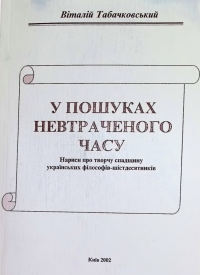In search of time not lost. Essays on the creative heritage of Ukrainian philosophers of the sixties: Kyiv, PARAPAN, 2002, 297 p.
Keywords:
Red existentialism, red positivism, totalitarianism, modern Western philosophy, Ukrainian philosophy, Soviet philosophy, marxismSynopsis
The book examines the fate of the intellectual heritage of the cohort of the most famous Ukrainian philosophers of the 1960s. It reveals the theoretical, cultural and political significance of the developments in this field, which are associated with two trends in philosophy: "red existentialism" and "red positivism". Their intensive interaction in Ukraine created a unique palette, first of all, for spiritual revival (as well as for "civic self-preservation" in the conditions of totalitarianism, post- and neo-totalitarianism). The author traces the consonance of each of the theoretical subjects with influential trends in modern Western philosophy.
The book is addressed to scholars, teachers, and students, as well as anyone interested in the history of Ukrainian philosophy of the modern period.
CONTENTS
Foreword
- Are we in philosophy or is philosophy in us? (On the formation of the Kyiv worldview-anthropological trend)
1.1. The atmosphere
1.2. The first attempts to "join Europe"
1.3. "Personnel decides everything" (or almost everything...)
1.4. "The problem of verification"
1.5. Once again about Europe: a worldview tradition
1.6. And again about personnel
1.7. Trends and prospects for anthropological reflection
Action one: personalized time
- Neo-Marxism in Ukraine: from doctrine to "open system" (Pavlo Kopnin)
2.1. Do not "rest" on Marxism
2.2 "Marxism-Socraticism"
2.3. On the concrete-historical vision of the creative heritage of the philosophers of the sixties (reflections on some encyclopedic comparisons)
- From universality of the genus to individual existential totality (Volodymyr Shynkaruk)
3.1. Paradoxes of "real humanism"
3.2. Existential Neo-Hegelianism
3.3 On the way to Hegel
3.4. Towards a new ontology
3.5. The material-subjective and the practical-spiritual
3.6. Authentication of Marx and the "shift of the semantic center"
3.7. Anthropocultural revision of the principle of activity
3.8. Spirit as the courage to overcome the tragedy of individual essential being
- The fate of Marxism's "grandfather's daughter" - dialectics (Maria Zlotina)
4.1 Rationality. Existentiality. Irony. Dialogism. Some historical parallels
4.2. Dialectic and "openness" of philosophizing
4.3. The "fairy-tale archetype" of totalitarian ideology
4.4. Is dialectic applicable to itself?
- "Ways of freedom" yesterday and today (Igor Bychko)
5.1. The principle of freedom is in self-development of the individual
5.2. Traditional and new "labyrinths" of freedom
5.3. Between the "individualist" and "communalist" versions of freedom
- The principle of activity and the first attempt to "ethicise" it (Oleksandr Yatsenko)
6.1. The de-scaling of activity by official Marxism
6.2. Ukrainian and Western European neo-Marxism
6.3. The diversity of differences
6.4. On the value regulation of activity
6.5. Moral accuracy of the goal
6.6. Worldview values and practical ethos
- Activity, culture, life world of the individual (Vadym Ivanov)
7.1. Authentic Marxism is a dissent [inakomyslie]
7.2. Culture as a link of mediation
7.3. Culture and morality
7.4. Being – Life – Life World
7.5. Experience: the individual versus the universal
7.6. The impersonality of the ideal and the personality of the spiritual
- Post-Marxist rationality versus the "theatre of social (and other) absurdities" (Myroslav Popovych)
8.1. Scientism and humanistics: a possible agreement
8.2. Rationality and quasi-rationality
8.3. Another prerequisite for understanding scientism and humanistics: "cultivated" post-positivism in Ukraine
8.4. Culturalised neorationalism
- The sophianic noosphere of the personal universe (Sergii Krymskyi)
9.1. Noosphericity begins with the minimum of the obligatory
9.2. Noosphere begins with me, not with another
9.3. Noosphere is the ability to do the maximum with the minimum
9.4. Noosphere as an increase in the value potential of cognition: ethically saturated rationality
- Humanistic and ecological potential of technology and culture (Mykola Tarasenko)
10.1. Ecological and worldview dilemma of the present
10.2. Nature in the structure of the human Cosmo-Psycho-Logos
10.3. Worldview, cultural and environmental issues in the works of Mykola Tarasenko
10.4. The problem of attitude to nature at different stages of research of the Kyiv school of worldview and anthropology
- "We exist, we know that we exist, and we love this existence and this knowledge we have" (Heorhii Zaichenko)
11.1. Complementarity of empiricism and rationalism
11.2. The echo of epochs
11.3. Pluralism and unity of philosophical knowledge
11.4. "Linguisticism", " phenomenologism", "sense-life"
11.5. Anthropological and reflective lessons
11.6. "The capital is where I am" (G. Skovoroda)
- Personalist anthropology of Oleksandr Kulchytskyi and the Kyiv School
12.1. Parallel one: worldview as a "consequence of a specific life experience"
12.2. Parallel two: "existentialisation" of the cogito
12.3. Parallel three: the problem of "endothymic foundations"
12.4. Parallel four: the personalist intention
Act Two: time is found (some concepts)
- Perspectives and limits of anthropocentrism
13.1 The caring ego: beyond ego-ism (Seneca and Foucault)
13.2. How "vitalistic" is philosophical anthropology today?
13.3. The limits of goal-instrumentalism and anthropocentrism
- Phenomenologising the methodology of anthropological reflection
14.1 The instructive experience of neighbours
14.2. Our own experience: "Marxism- phenomenologism"
14.3. Phenomenological "intuition of corporeality" in historical perspective
- The evolution of ideas about practice: neo-, post-Marxism and contemporary practical philosophy
15.1. Simplification of the problem of practice by the "lying" Marxists
15.2. Neo-Marxist "goal-oriented rationality"
15.3. From goal-orientation to communicativity
15.4. Some parallels to communicative practical philosophy
- Anthropological ideals of the Kyiv School and the realities of postmodernity
16.1. On the content and limits of "de-idealisation"
16.2. Man, the world, world orders
16.3. Unification and forceful subjugation of the "alien" and deformation of the human form
- Anthropological reflection at the turn of the millennium
17.1. The epistemological conflict
17.2. Anthropological rigorism and tolerance
17.3. The new life of the idea of human capability
17.4. Why and how are we "sustainable in charity"?
17.5. On the specificity of tools of gaining knowledge
Downloads




